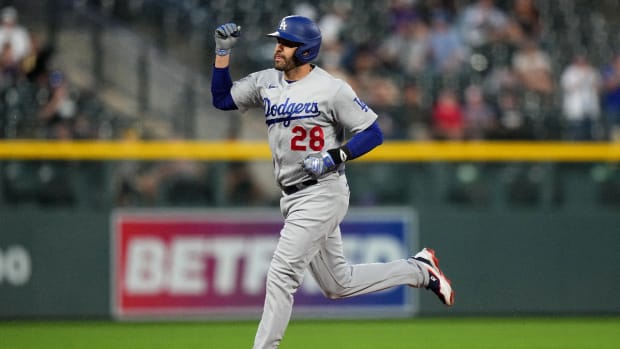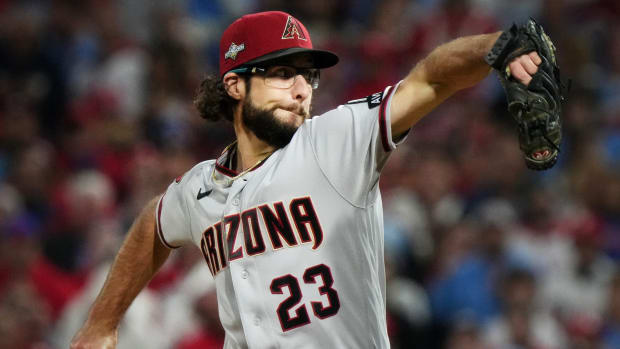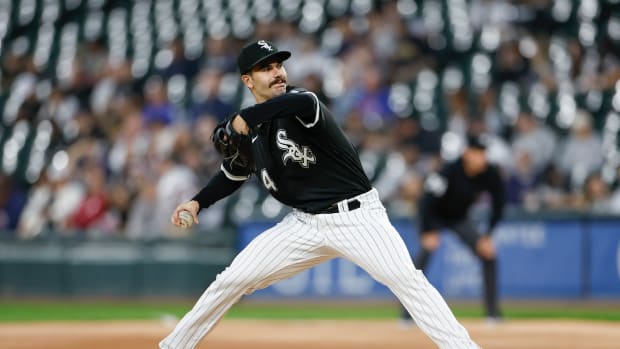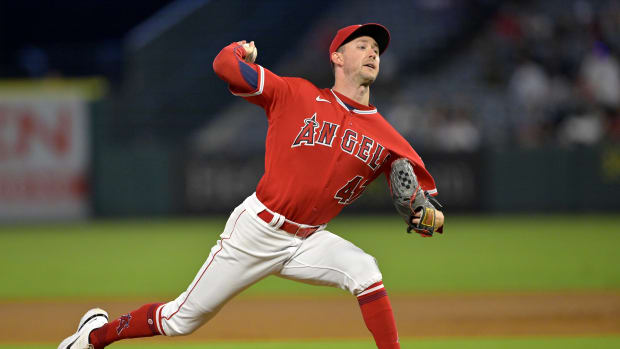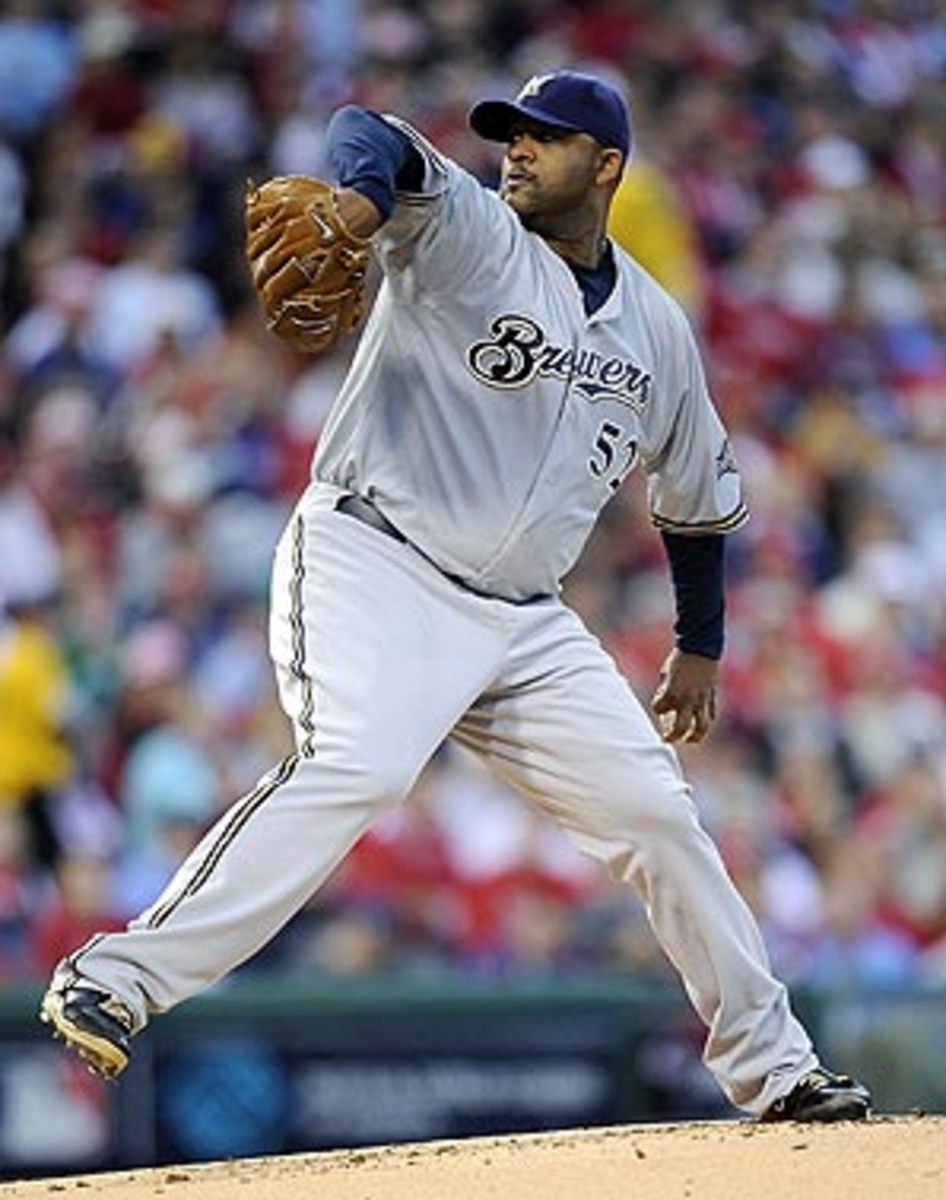
Unconventional Wisdom: Yankees get CC, but concerns follow
Sabathia is coming off a monster season, one in which his final line --17-10 with a career-best 2.70 ERA in a career-high 253 innings -- tells only a fraction of the story. The 28-year-old began the year with the Indians, the team that made him a first-round draft pick way back in 1998 and the one he'd led to within one win of a World Series berth in 2007 while winning the AL Cy Young award. The Indians were expected to contend in 2008, but their quick fade led them to trade the pending free agent to the Brewers for four players, including Milwaukee's 2007 first-round pick, Matt LaPorta, on July 7. Sabathia had contributed to the Indians' slow start, being rocked for a 13.50 ERA over his first four appearances, and was just 6-8 with a 3.83 ERA at the time of the deal.
He caught fire with the Brewers, who were expected to contend after a near-miss 2007 but whose rotation had been decimated by injuries to Chris Capuano and ace-in-waiting Yovani Gallardo. The big man won his first nine decisions as a Brewer, putting up a 1.43 ERA and averaging eight innings per start through the end of August. He shouldered an even bigger burden in September: With the Brewers in a dogfight for the wild-card spot, he made his final three starts of the year on three days' rest, winning the last two and going the distance on the final day of the season to clinch the team's first playoff berth in 26 years. Though the Brewers didn't make it out of the Division Series, the Milwaukee portion of Sabathia's performance was so impressive --11-2 with a 1.65 ERA, a league-high seven complete games and three shutouts -- that he garnered support in both the MVP and Cy Young balloting, finishing sixth and fifth, respectively. In all, Sabathia led the majors in starts, innings pitched, complete games and shutouts and was fourth in ERA, second in strikeouts, fifth in strikeout rate and eighth in strikeout-to-walk ratio.
Those last numbers are very important. Strikeout rate is the key indicator of a pitcher's future success because it provides the window into his ability to fool hitters with his offerings; a pitcher's strikeout rate generally declines as he ages, but a high strikeout rate gives him more headroom before he does so. Furthermore, the more strikeouts a pitcher can notch, the less reliant he is upon his defense, which can vary in its ability to convert balls in play into outs. On that note, the Yankees were one of the majors' least efficient defensive teams, ranking 25th out of 30 teams in both raw Defensive Efficiency (.682) and Park Adjusted Defensive Efficiency (2.42 percent below average). According to PADE, that's about 30 runs -- three net wins -- below average, thanks in large part to poor up-the-middle defense by indifferent second baseman Robinson Cano, aging shortstop Derek Jeter (who has always been overrated by the media for his abilities in the field but near the bottom of the pile in any advanced statistical system) and rag-armed center fielder Johnny Damon. Cano and Jeter are still in place, and while Damon may move back to leftfield, the Yanks still need to upgrade in center.
Sabathia's strikeout-to-walk ratio doesn't just indicate excellent control (a pitcher's ability to throw strikes) but excellent command -- his ability to throw good strikes, to put the ball where he wants to with consistency. It's generally an indicator of sound mechanics, because without those, a pitcher won't be able to hit his spots with that level of consistency. That's important when it comes to gauging the risk of a pitcher of Sabathia's stature. He may be 6-foot-7 and pushing 300 pounds, but he's very athletic, and his ability to repeat his motion ranks with anyone in the game. Baseball history is full of oversized pitchers who have been able to succeed despite their girth, with names like Mickey Lolich, Rick Reuschel, Bartolo Colon and David Wells coming to mind. All had excellent strikeout-to-walk ratios.
That said, seven years and $160 million is a ton to bet on Sabathia's continued health through his age-34 season. The list of nine-figure contracts given to pitchers is a short and not-so-pretty one:
• Kevin Brown was healthy for only four full years of his seven-year, $105 million deal from the Dodgers, although he was already going on 34 when he signed it in December 1998. At least when he was healthy, he was lights out, with ERAs of 3.00 or below in those four seasons.
• Mike Hampton's eight-year, $121 million deal signed with the Rockies in 2001 turned out much worse; though only 28 when he signed, he was healthy for only the first half of the deal, then made just 25 starts over the final four years. When healthy he was rarely effective, besting the park-adjusted league average ERA only twice. His middling strikeout rate and low K/BB ratio should have warded the Rockies off.
• Barry Zito's seven-year, $126 million deal with the Giants, signed just two years ago, already looks like a disaster after a 10-17, 5.15 ERA showing this past year. A shrewd team could have read the signs of his diminished stuff in his strikeout and walk rates; his fastball can barely break a soft-boiled egg these days, and if he can't get his offspeed stuff over, his "heater" gets creamed.
• Johan Santana's six-year, $137.5 million extension from the Mets, signed upon his acquisition from the Twins back in February, appears to be the best-case scenario. The two-time AL Cy Young winner put up a Cy-caliber season in his first year in New York, going 16-7 with a 2.53 ERA. Even so, his diminished strikeout rate leaves cause for concern, and there's a long way to go on that deal.
Sabathia's initial offer from the Yanks was a six-year, $140 million deal designed to top Santana's pact, but even so, he didn't rush to accept it. He had received a surprisingly competitive, five year, $100 million offer from the Brewers during the exclusive negotiating period just after the World Series ended, but the California native was said to want to pitch closer to home. Depending upon whom you believe on the Hot Stove rumor circuit, he drew some level of interest from the Angels, Dodgers and Giants. Furthermore, it was reported yesterday that the Red Sox made Sabathia an offer as well.
The Red Sox, of course, are one of the teams this deal is aimed at, because the Yankees finished six games behind them in the AL East, missing the playoffs for the first time since 1993. Cashman's 2008 blueprint to bypass a potential trade for Santana and center his rotation on three hurlers who had never pitched full seasons in the majors -- Joba Chamberlain, Phil Hughes and Ian Kennedy -- backfired completely. All three dealt with injuries, with Hughes missing almost five months, and he and Kennedy failed to win a single game between them, combining for a 7.45 ERA in just 17 starts. Staff ace Chien-Ming Wang's season-ending injury in June didn't help, either, and as the Yanks plotted for 2009, neither did the retirement of 20-game winner Mike Mussina.
As such, Cashman made fixing the rotation his top priority, despite the fact that the Yankees system still has not only that heralded trio of youngsters but more pitchers on the horizon. On the other hand, their offense in 2008 was mediocre (seventh in the AL in scoring after leading the majors in 2007), and aging, with their only two regulars under 32 (Cano and Melky Cabrera) having miserable seasons. I've argued elsewhere that the Yankees should have instead pursued Mark Teixeira, the free-agent market's top hitter, for a few reasons. The switch-hitting first baseman would have given the offense a new centerpiece under the age of 30 while upgrading the porous defense as well; the Yankees have a dearth of near-ready hitters in their system; and the market contained at least one low-risk frontline pitcher in Derek Lowe. But given the Yankees' desire to net more than one free-agent pitcher, the pickings after Lowe quickly devolve into injury risks like A.J. Burnett and Ben Sheets, both of whom are very effective when healthy but who have combined to reach 30 starts just three times in the past four seasons. Sabathia has reached that mark seven times in his eight big-league seasons, failing to do so only in 2006 when he suffered a groin strain.
Sabathia has managed to avoid arm troubles in his career, and over the last three years he has become extremely efficient; his 15.1 pitches per inning last year was the 75th-highest mark among ERA qualifiers. On the other hand, he's coming off by far his two heaviest workloads of his career, and his only two years above 200 innings. His early 2008 problems were believed to be linked to his combined 256-inning workload from 2007, brought on by the Indians' deep October run,, where he exhibited the rare struggle with his command. His combined 256.2 innings with an early exit in his only postseason start this year was more of the same, though at least he'll have a couple of extra weeks rest this time around.
The Sabathia signing won't put the Yankees over the top by itself, particularly given that it now makes Boston the favorite to sign Teixeira to upgrade a more potent offense than the Yankees can muster and that the young and already stocked Rays have frontline starter David Price and even more top prospects still on the way. Sabathia can't be expected to match the dominance he showed in his Milwaukee stint because the American League, and the AL East in particular -- statistically the toughest five-team division of the wild-card era -- is a more difficult place to pitch; at the very least one can expect his strikeout rate to drop, since he'll face designated hitters instead of pitchers. His Cleveland numbers are a better guide to his future performance than his Milwaukee ones.
In all, the move makes a splash in New York by putting most of the Yankees' eggs into one very big basket and by compensating for the type of deal Cashman apparently wishes he'd made last winter. While it may pay off in the short term, it may prevent them from addressing other big needs, and could very well net them bigger headaches down the road.






























